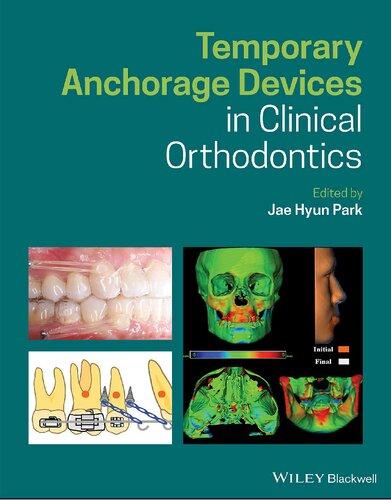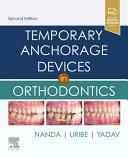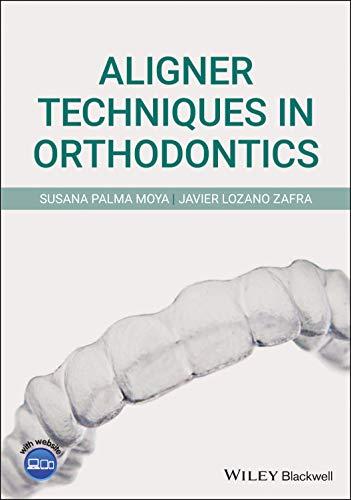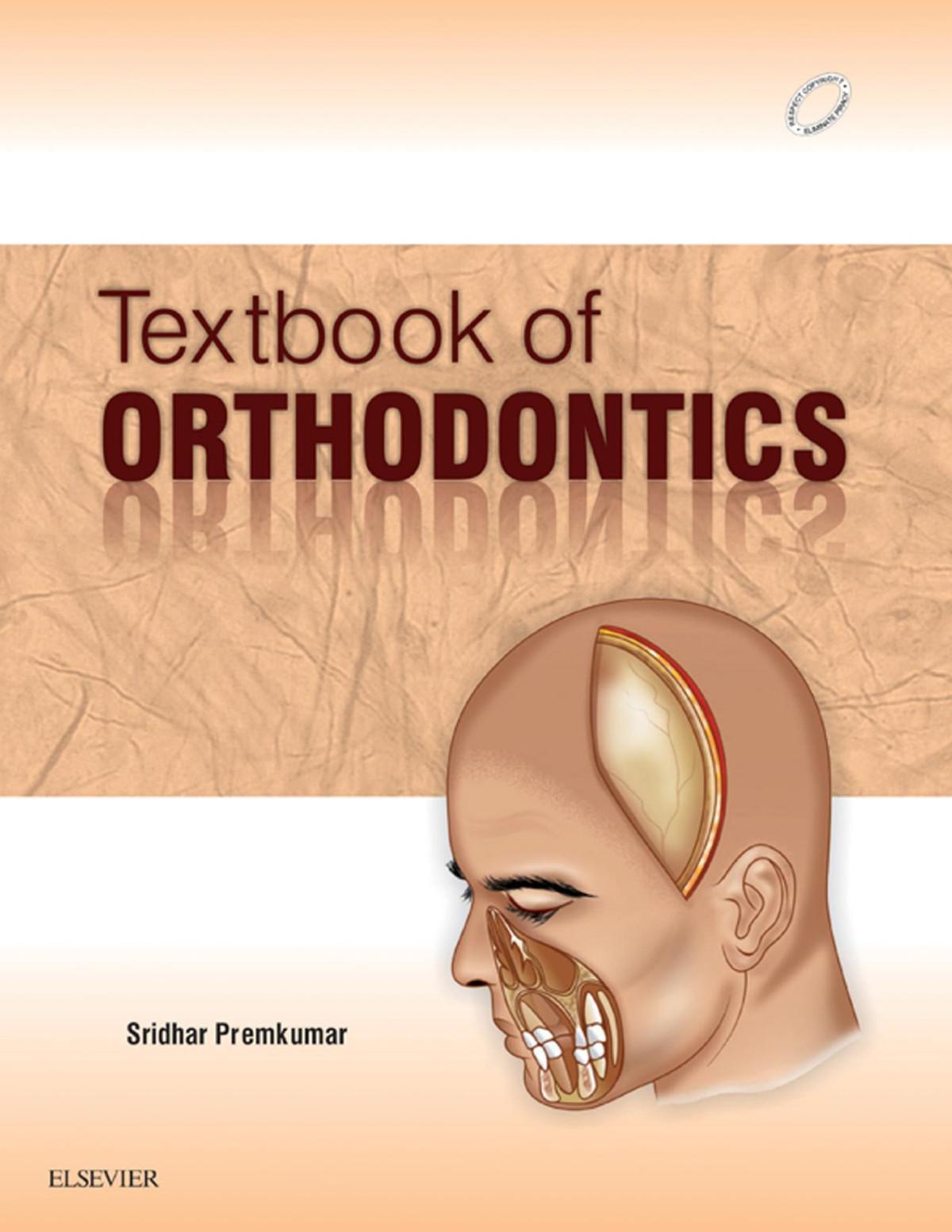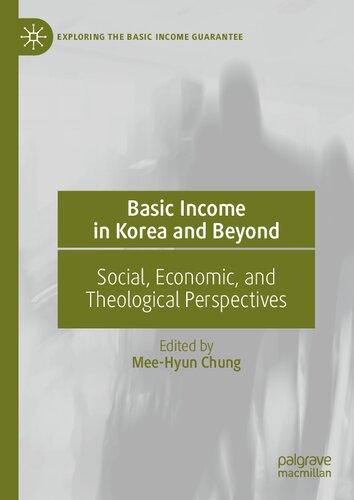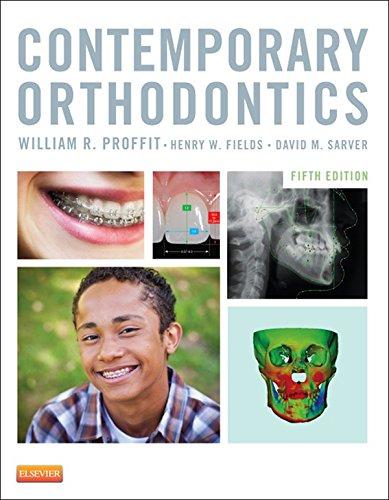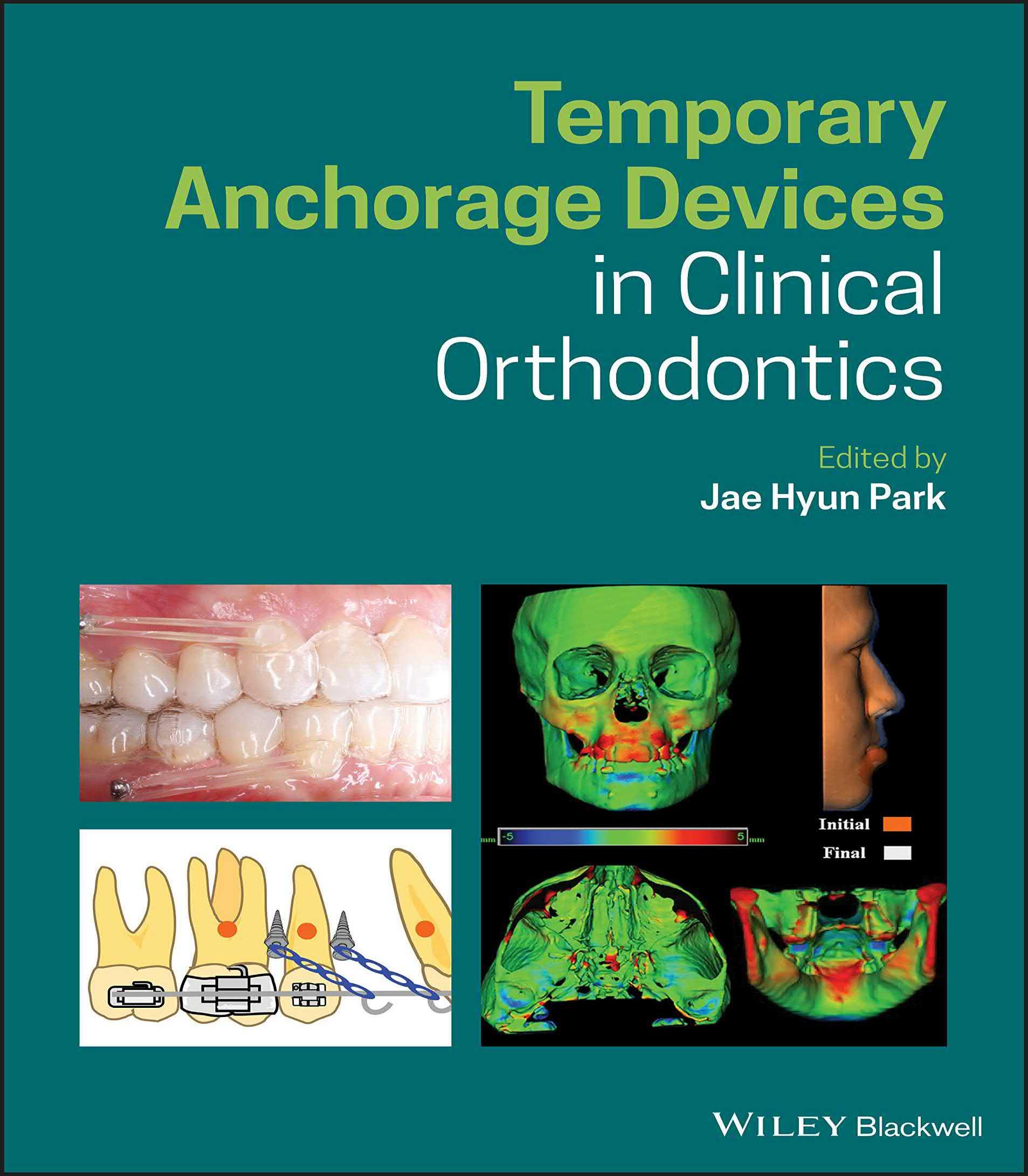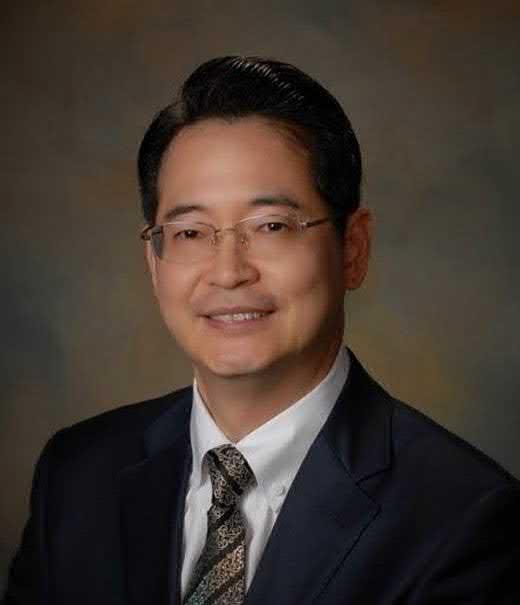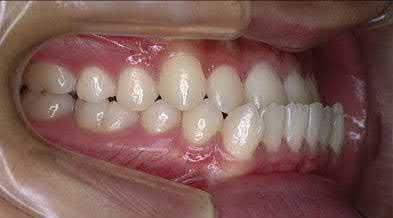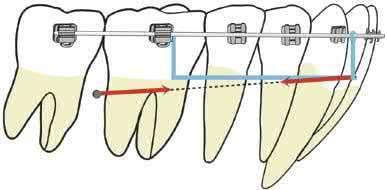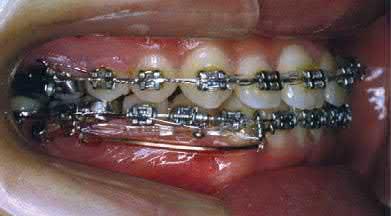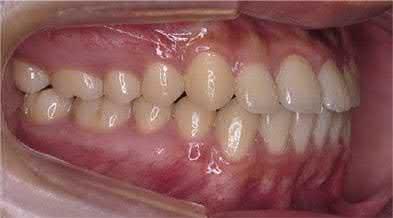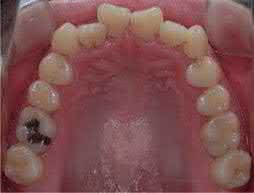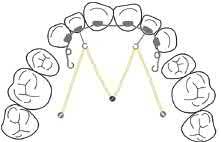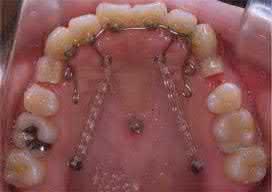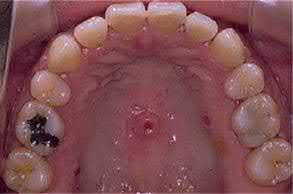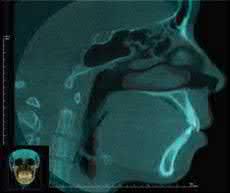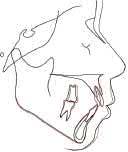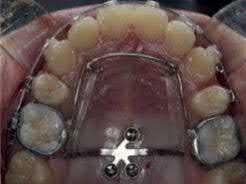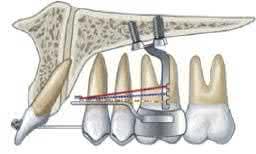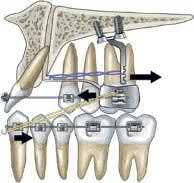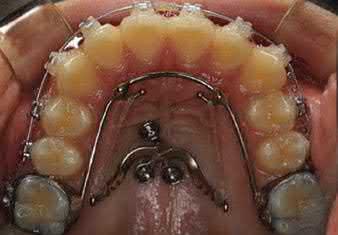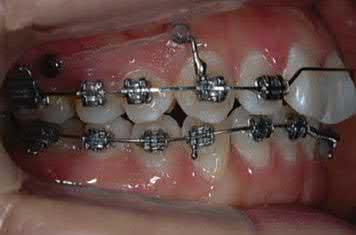Temporary Anchorage Devices in Clinical Orthodontics
Edited by
Jae Hyun Park, DMD, MSD, MS, PhD
Diplomate, American Board of Orthodontics
Professor and Chair
Postgraduate Orthodontic Program
Arizona School of Dentistry & Oral Health
A.T. Still University Mesa, AZ, USA;
International Scholar
Graduate School of Dentistry
Kyung Hee University
Seoul, South Korea
This edition first published 2020 © 2020 John Wiley & Sons, Inc.
All rights reserved. No part of this publication may be reproduced, stored in a retrieval system, or transmitted, in any form or by any means, electronic, mechanical, photocopying, recording or otherwise, except as permitted by law. Advice on how to obtain permission to reuse material from this title is available at http://www.wiley.com/go/permissions.
The right of Jae Hyun Park to be identified as the author of this work has been asserted in accordance with law.
Registered Office
John Wiley & Sons, Inc., 111 River Street, Hoboken, NJ 07030, USA
Editorial Office
111 River Street, Hoboken, NJ 07030, USA
For details of our global editorial offices, customer services, and more information about Wiley products visit us at www.wiley.com.
Wiley also publishes its books in a variety of electronic formats and by print‐on‐demand. Some content that appears in standard print versions of this book may not be available in other formats.
Limit of Liability/Disclaimer of Warranty
The contents of this work are intended to further general scientific research, understanding, and discussion only and are not intended and should not be relied upon as recommending or promoting scientific method, diagnosis, or treatment by physicians for any particular patient. In view of ongoing research, equipment modifications, changes in governmental regulations, and the constant flow of information relating to the use of medicines, equipment, and devices, the reader is urged to review and evaluate the information provided in the package insert or instructions for each medicine, equipment, or device for, among other things, any changes in the instructions or indication of usage and for added warnings and precautions. While the publisher and authors have used their best efforts in preparing this work, they make no representations or warranties with respect to the accuracy or completeness of the contents of this work and specifically disclaim all warranties, including without limitation any implied warranties of merchantability or fitness for a particular purpose. No warranty may be created or extended by sales representatives, written sales materials or promotional statements for this work. The fact that an organization, website, or product is referred to in this work as a citation and/or potential source of further information does not mean that the publisher and authors endorse the information or services the organization, website, or product may provide or recommendations it may make. This work is sold with the understanding that the publisher is not engaged in rendering professional services. The advice and strategies contained herein may not be suitable for your situation. You should consult with a specialist where appropriate. Further, readers should be aware that websites listed in this work may have changed or disappeared between when this work was written and when it is read. Neither the publisher nor authors shall be liable for any loss of profit or any other commercial damages, including but not limited to special, incidental, consequential, or other damages.
Library of Congress Cataloging‐in‐Publication Data
Names: Park, Jae Hyun, 1963– editor.
Title: Temporary anchorage devices in clinical orthodontics / edited by Jae Hyun Park.
Description: Hoboken, NJ : Wiley-Blackwell, 2020. | Includes bibliographical references and index.
Identifiers: LCCN 2019047712 (print) | LCCN 2019047713 (ebook) | ISBN 9781119513476 (hardback) | ISBN 9781119513650 (adobe pdf) | ISBN 9781119513629 (epub)
Subjects: MESH: Orthodontic Anchorage Procedures–methods | Orthodontic Appliances | Case Reports
Classification: LCC RK521 (print) | LCC RK521 (ebook) | NLM WU 400 | DDC 617.6/43–dc23
LC record available at https://lccn.loc.gov/2019047712
LC ebook record available at https://lccn.loc.gov/2019047713
Cover Design: Wiley
Cover Images: (top left) Image of human teeth courtesy of Joorok Park, (bottom left) line drawing of human gum courtesy of KJ Lee, (right) Scanned image of human skeleton courtesy of Dr. Tung Nguyen
Set in 9.5/12.5pt STIXTwoText by SPi Global, Pondicherry, India
10 9 8 7 6 5 4 3 2 1
Contents
List of Contributors xi
Foreword xxi
Preface xxiii
Acknowledgement xxv
About the Editor xxvii
Section I Fundamental Perspectives on TADs 1
1 An Overview of Clinical Applications for Temporary Anchorage Devices (TADs) 3
Jae Hyun Park and Kyungsup Shin
2 Biomechanical Considerations for Controlling Target Tooth Movement with Mini-implants 17
Jung Yul Cha
3 Biomechanical Simulations for Various Clinical Scenarios Treated with TADs 27
Tai-Hsien Wu and Ching-Chang Ko
4 Histological Aspects During the Healing Process with TADs 37
Toru Deguchi
5 The Effects of TADs on the Alveolar Bone 45
Jing Chen, Karolina Kister, and Sunil Wadhwa
6 Mechanical Aspects of TADs 53
Toru Deguchi and Do-Gyoon Kim
7 Factors Affecting the Failure of TADs and Effor ts to Improve the Biomechanical Stability of TADs 61
Sung-Hwan Choi and Chung-Ju Hwang
8 TADs and Successful Clinical Outcomes 69
Chung H. Kau and Terpsithea Christou
9 Clinical, Mechanical, and Diagnostic Indices for the Placement of TADs 77
Mitsuru Motoyoshi
10 Considerations for the Placement of TADs 83
Alejandro A. Romero-Delmastro, Onur Kadioglu, and G. Frans Currier
11 Understanding Implant Sites for TADs 91
Hyung Seog Yu
12 Palatal TADs: Anatomical Considerations 99
Mohamed Bayome, Jae Hyun Park, and Yoon-Ah Kook
13 Implant Site Selection 107
Sebastian Baumgaertel
Section II Three-dimensional Correction with TADs 115
Anteroposterior Correction 117
14 Treating Skeletal Class II Hyperdivergent Patients: A Structured Decision-making Process 117
Peter H. Buschang and Larry Tadlock
15 Class II Correction with Skeletal Anchorage and Forsus 133
Min-Ho Jung
16 Distalization of Maxillary and Mandibular Molars with TADs 143
Jae Hyun Park, Mohamed Bayome, and Yoon-Ah Kook
17 Effective Treatment of Class II Malocclusion with the TAD-suppor ted amda® 153
Moschos A. Papadopoulos
18 The Use of TADs with a Wilson Distalizing Arch 161
Tarek El‐Bialy and Budi Kusnoto
19 The Use of TADs to Correct Challenging Class II Sagittal Discrepancies 169
Goli K. Parsi and Mohamed I. Masoud
20 Dentofacial Orthopedics for Class III Corrections with Bone‐anchored Maxillary Protraction 185
Tung Nguyen
21 TAD-anchored Maxillary Protraction 191
Dong-Hwa Chung
22 Protraction Headgear with Surgical Miniplates 199
Bong‐Kuen Cha
Transverse Correction 213
23 Total Arch Distalization and Control of Transverse Discrepancy with TADs 213
Ju Young Lee, Hwa Sung Chae, and Young Ho Kim
24 Maxillary Expansion in Skeletally Mature Patients with TADs 223
Won Moon
25 Maxillary Expansion with TADs in Young Adults 233
Peter Ngan and Hong He
26 TAD-assisted Naso-maxillo-pharyngeal Expansion 243
Kyung-A Kim, Su-Jung Kim, and Young-Guk Park
27 Scissor Bite Correction with TADs 259
Kyung-Min Lee, Sung-Hoon Lim, Gye-Hyeong Lee, and Jae Hyun Park
Vertical Correction 271
28 Clinical Outcomes with TADs and Conventional Mechanics in Adult Skeletal Open Bite and Class II Patients 271
Toru Deguchi and Keiichiro Watanabe
29 Control of Vertical Dimension and Chin Position in Class II Malocclusion with Miniscrew Implants 285
P. Emile Rossouw, Dimitrios Michelogiannakis, and Glen Hintz
30 Anterior Open Bite Correction with One Midpalatal TAD 297 Tae-Woo Kim
31 Treatment of Open Bite with TADs: The Nature of Molar Intrusion and Relapse 309
Masato Kaku, Kazuo Tanne, and Kotaro Tanimoto
32 Double Arch Intrusion: Effective Use of TADs to Correct Vertical Excess 319 Cheol-Ho Paik and Hwee-Ho Kim
Section III Clinical Applications of TADs 327
33 Three-dimensional Application of Orthodontic Miniscrews and Their Long-term Stability 329 Yoon Jeong Choi and Young-Chel Park
34 Tweed–Merrifield Directional Force Technology with TADs 337 Jong-Moon Chae and Jae Hyun Park
35 Non-extraction Treatment of Class II Hyperdivergent Patients with Orthodontic Mini-implants 349
Hyo-Won Ahn and Seung-Hak Baek
36 Clinical Application of Palatal TADs 359 Sung-Hoon Lim
37 Management of Missing Teeth with C-implants 369 Seong-Hun Kim, Min-Ki Noh, Kyu-Rhim Chung, and Gerald Nelson
38 Indirect Miniscrew Anchorage for Adjunctive Orthodontic Treatment: Clinical Applications and Stability 383 Kyung-Ho Kim, Yoon Jeong Choi, and Woowon Jang
39 TADs for Limited Orthodontic Treatment 393
Masamitsu Takahashi and Satoshi Uzuka
40 Uprighting Impacted Mandibular Second Molars with a Cantilever System Using TADs 405 Sang-Jin Sung
41 Orthodontic Treatment of TMD Patients with Posterior Intrusion Using TADs 415 Gye-Hyeong Lee, Sang-Mi Lee, Sun Kyong Yoo, and Jae Hyun Park
42 Insights to Extraradicular Bone Screw Applications for Challenging Malocclusions 433
Chris H. Chang, Joshua S. Lin, Hsin-Yin Yeh, and W. Eugene Roberts
43 The Biomechanics of Extra-alveolar TADs in Or thodontics 445
Marcio Rodrigues de Almeida
44 A New and Innovative TAD System for Improved Stability and Versatility 455
Carlos Villegas and Flavio Uribe
45 Palatal and Ramal Plate Applications 467
Yoon-Ah Kook, Jae Hyun Park, and Mohamed Bayome
46 Miniscrews vs. Miniplates 477
Nour Eldin Tarraf and M. Ali Darendeliler
47 Progress of Anchorage in Lingual Orthodontic Treatment 489
Hee Moon Kyung
48 Biomechanics of Lingual Orthodontics and TADs 497
Ryoon-Ki Hong
49 TADs with a Fully Customized CAD-CAM Lingual Bracket System 513
Toru Inami
50 TAD-assisted Lingual Retractors 527
Ki-Ho Park, Hyo-Won Ahn, and Yoon-Goo Kang
51 TADs and Invisalign: Making Difficult Movement Possible 541
Joorok Park and Robert L. Boyd
52 The Use of TADs with Clear Aligners for Asymmetry Correction 555
William J. Kottemann
53 Microimplant-assisted Aligner Therapy 563
Ramon Mompell and S. Jay Bowman
54 Safe and Precise TAD Placement in the Anterior Palate with Simple and Inexpensive TAD Guides 577
Philipp Eigenwillig, Björn Ludwig, and Axel Bumann,
Section IV Esthetic Control with TADs 587
55 Correction of Occlusal Canting with TADs 589
Tae-Woo Kim
56 Treatment of Facial Asymmetry with Microimplants 603
Hyo-Sang Park
57 Facial Asymmetry: Non-surgical Orthodontic Treatment Considerations 615
Kelvin Wen-Chung Chang
58 The Application of TADs for Gummy Smile Correction 633
Kee-Joon Lee
59 Application of TADs in an Adult Gummy Smile Case with Ver tical Maxillary Excess 647
Johnny J.L. Liaw
60 Facial Esthetics-oriented Treatment Planning with Dental VTOs and TADs 661
Sercan Akyalcin
61 Improved Facial Profile with Premolar Extraction and Molar Intrusion Using TADs and VTOs 675
Kiyoshi Tai and Jae Hyun Park
Section V Application of TADs in Surgical Cases 685
62 TADs vs. Orthognathic Surgery 687
Jeong‐Ho Choi
63 Advantages of Miniscrew Usage for Pre‐ and Post-operative Orthodontics in Skeletal Class III Malocclusion Patients 697
Seong Sik Kim and Sung‐Hun Kim
64 Orthodontic Biomechanics with Miniplates in the Surgery‐first Orthognathic Approach 709
Jorge Faber, Carolina Faber, and Patricia Valim
Section VI Complications with the Use of TADs 717
65 Biomechanical Mistakes Related to the Use of TADs 719
Ki Beom Kim and Guilherme Thiesen
66 Pros and Cons of Miniscrews and Miniplates for Orthodontic Treatment 731
Cheol‐Hyun Moon
67 Orthodontic Miniscrews: The Pearls and Pitfalls of TADs 739
Takashi Ono
68 Success with TADs: Evidence and Experience 747
Melih Motro and Leslie A . Will
69 Legal Considerations When Using TADs 757
Laurance Jerrold and Michael Schulte
Index 765
List of Contributors
Hyo-Won Ahn, DDS, PhD Associate Professor Department of Orthodontics School of Dentistry
Kyung Hee University Seoul, South Korea
Sercan Akyalcin, DDS, MS, PhD
Associate Professor and Graduate Program Director Department of Orthodontics School of Dental Medicine
Tufts University Boston, MA, USA
Seung-Hak Baek, DDS, PhD Professor Department of Orthodontics School of Dentistry
Seoul National University Seoul, South Korea
Sebastian Baumgaertel, DMD, MSD, FRCD(C) Clinical Associate Professor Department of Orthodontics School of Dental Medicine
Case Western Reserve University Cleveland, OH, USA
Mohamed Bayome, BDS, MMS, PhD Assistant Professor Department of Preventive Dentistry College of Dentistry
King Faisal University
Al-hofuf, Saudi Arabia; and Department of Postgraduate Studies Universidad Autonóma del Paraguay Asunción, Paraguay
S. Jay Bowman, DMD, MSD
Adjunct Associate Professor Department of Orthodontics Center for Advanced Dental Education St. Louis University
St. Louis, MO; Instructor Department of Orthodontics School of Dentistry
University of Michigan
Ann Arbor, MI; and Private Practice Portage, MI, USA
Robert L. Boyd, DDS, Med Professor Emeritus Department of Orthodontics
Arthur A. Dugoni School of Dentistry University of the Pacific San Francisco, CA, USA
Axel Bumann, DDS, PhD, Prof.Dr.Med.Dent.
Associate Professor Department of Orthodontics Christian-Albrechts-University Kiel; and Private Practice Berlin, Germany
Peter H. Buschang, PhD
Regents Professor and Director of Orthodontic Research Department of Orthodontics
Texas A&M University College of Dentistry Dallas, TX, USA
Bong-Kuen Cha, DDS, MSD, Dr.Med.Dent. Professor
Department of Orthodontics College of Dentistry
Gangneung-Wonju National University Gangneung, South Korea
Jung Yul Cha, DDS, MS, PhD Professor Department of Orthodontics
Institute of Craniofacial Deformity
Yonsei University College of Dentistry
Seoul, South Korea
Hwa Sung Chae, DDS, MSD, PhD Lecture Professor
Department of Orthodontics Institute of Oral Health Science
Ajou University School of Medicine Suwon, South Korea
Jong-Moon Chae, DDS, MSD, PhD Professor
Department of Orthodontics School of Dentistry
University of Wonkwang Wonkwang Dental Research Institute
Iksan, South Korea; and Visiting Scholar
Postgraduate Orthodontic Program
Arizona School of Dentistry & Oral Health
A.T. Still University Mesa, AZ, USA
Chris H. Chang, DDS, PhD
Founder and President
Beethoven Orthodontic Center Hsinchu, Taiwan
Kelvin Wen-Chung Chang, DDS, MS
Adjunct Clinical Instructor
Division of Orthodontics and Dentofacial Orthopedics Department of Dentistry
National Taiwan University Hospital Taipei, Taiwan
Jing Chen, PhD, DDS
Assistant Professor and Program Director Division of Orthodontics College of Dental Medicine Columbia University New York, NY, USA
Jeong-Ho Choi, DDS, MSD, PhD
Adjunct Associate Professor Department of Orthodontics School of Dentistry
Seoul National University Seoul, South Korea
Sung-Hwan Choi, DDS, MS, PhD
Assistant Professor
Department of Orthodontics
Institute of Craniofacial Deformity
Yonsei University College of Dentistry
Seoul, South Korea
Yoon Jeong Choi, DDS, MSD, PhD
Associate Professor
Department of Orthodontics
Institute of Craniofacial Deformity
Yonsei University College of Dentistry
Seoul, South Korea
Terpsithea Christou, DDS, MS, Cert(Ortho)
Assistant Professor and Clinical Director
Department of Orthodontics
School of Dentistry
University of Alabama at Birmingham Birmingham, AL, USA
Dong-Hwa Chung, DDS, MS, PhD
Professor and Chair
Department of Orthodontics
College of Dentistry
Dankook University Cheonan, South Korea
Kyu-Rhim Chung, DMD, MSD, PhD
Clinical Professor
Department of Orthodontics
School of Dentistry
Kyung Hee University
Seoul, South Korea
G. Frans Currier, DDS, MSD, Med
David Ross Boyd Professor and Head
R.S. Nanda Endowed Chair Department of Developmental Dentistry
Division of Orthodontics College of Dentistry
University of Oklahoma HSC
Oklahoma City, OK, USA
M. Ali Darendeliler, BDS, PhD, Dip.Orth., Certif.Orth., Priv.Doc., MRACDS(Ortho), FICD
Professor and Chair
Discipline of Orthodontics and Pediatric Dentistry
School of Dentistry
Faculty of Medicine and Health
University of Sydney, Sydney; and Head
Department of Orthodontics
Sydney Dental Hospital
Sydney Local Health District
Sydney, Australia
Toru Deguchi, DDS, MSD, PhD
Associate Professor and Graduate Program Director
Division of Orthodontics
College of Dentistry
The Ohio State University Columbus, OH, USA
Philipp Eigenwillig, Dr.Med.Dent.
Private Practice
Brandenburg an der Havel Germany
Tarek El-Bialy, BDS, MSc, PhD, EMBA, DrMedDent
Professor Division of Orthodontics
Department of Biomedical Engineering Faculty of Medicine and Dentistry
University of Alberta Edmonton, Canada
Carolina Faber, DDS
Private Practice
Brasília, Brazil
Jorge Faber, DDS, MS, PhD
Professor
Postgraduate Program in Dentistry University of Brasília, Brasília; and Private Practice
Brasília, Brazil
Hong He, DDS, MDS, PhD
Professor
Department of Orthodontics
Hubei-MOST KLOS & KLOBM
School & Hospital of Stomatology Wuhan University Wuhan, China
Glen Hintz, MS
Associate Professor
Medical Illustration Program Director
BFA Medical Illustration and Chairperson
School of Art & School for American Crafts College of Art and Design
Rochester Institute of Technology Rochester, NY, USA
Ryoon-Ki Hong, DDS, PhD
Adjunct Assistant Professor Department of Orthodontics College of Dentistry
Seoul National University, Seoul; and
Chair
Department of Orthodontics
Chong-A Dental Hospital
Seoul, South Korea
Chung-Ju Hwang, DDS, MS, PhD
Professor
Department of Orthodontics
Institute of Craniofacial Deformity
Yonsei University College of Dentistry
Seoul, South Korea
Toru Inami, DDS, PhD
Clinical Professor
Department of Orthodontics
Aichi Gakuin University
Nagoya; and Private Practice Kyoto, Japan
Woowon Jang, DDS, MSD, PhD
Clinical Assistant Professor Department of Orthodontics
School of Dentistry
Kyung Hee University
Seoul, South Korea
Laurance Jerrold, DDS, JD Professor and Chair Program Director
Orthodontic Residency Program NYU Langone Health Brooklyn, NY, USA
Min-Ho Jung, DDS, MSD, PhD
Adjunct Associate Professor Department of Orthodontics
Dental Research Institute
School of Dentistry
Seoul National University Seoul; and Private Practice
Seoul, South Korea
Onur Kadioglu, DDS, MS
Associate Professor and Program Director Graduate Alumni Endowed Chair Department of Developmental Dentistry
Division of Orthodontics
College of Dentistry
University of Oklahoma HSC Oklahoma City, OK, USA
Yoon-Goo Kang, DMD, MSD, PhD
Associate professor
Department of Orthodontics School of Dentistry
Kyung Hee University Seoul, South Korea
Masato Kaku, DDS, PhD
Professor Department of Anatomy and Functional Restorations
Division of Oral Health Sciences
Hiroshima University Graduate School of Biomedical Sciences
Hiroshima, Japan
Chung H. Kau, BDS, MScD, MBA, PhD, FDSGlas, MOrthEdin, FFDIre, FAMS, FICD, FDSEdin, Cert(Ortho) Professor and Chair
Department of Orthodontics School of Dentistry
University of Alabama at Birmingham Birmingham, AL, USA
Do-Gyoon Kim, PhD
Associate Professor Division of Orthodontics College of Dentistry
The Ohio State University Columbus, OH, USA
Hwee-Ho Kim, DDS, MSD
Clinical Fellow
Department of Orthodontics Asan Medical Center College of Medicine University of Ulsan Seoul; and Clinical Faculty
Department of Orthodontics College of Dentistry
Dankook University
Cheonan, South Korea
Ki Beom Kim, DDS, MSD, PhD
Lysle E. Johnston Jr. Endowed Chair in Orthodontics
Associate Professor and Program Director
Department of Orthodontics Center for Advanced Dental Education
Saint Louis University
St. Louis, MO, USA
Kyung-A Kim, BS, MSD, PhD
Assistant Professor
Department of Orthodontics School of Dentistry
Kyung Hee University
Seoul, South Korea
Kyung-Ho Kim, DDS, MSD, PhD Professor and Chair Department of Orthodontics
Gangnam Severance Dental Hospital Institute of Craniofacial Deformity
Yonsei University College of Dentistry
Seoul, South Korea
Seong-Hun Kim, DMD, MSD, PhD
Professor and Head Department of Orthodontics
School of Dentistry
Kyung Hee University Seoul, South Korea
Seong Sik Kim, DDS, MSD, PhD Professor
Department of Orthodontics School of Dentistry
Pusan National University Yangsan, South Korea
Su-Jung Kim, DMD, MSD, PhD Professor and Chair Department of Orthodontics School of Dentistry
Kyung Hee University
Seoul, South Korea
Sung-Hun Kim, DDS, MSD, PhD
Clinical Professor
Department of Orthodontics School of Dentistry
Pusan National University Yangsan, South Korea
Tae-Woo Kim, DDS, MSD, PhD Professor
Department of Orthodontics School of Dentistry
Seoul National University Seoul, South Korea
Young Ho Kim, DDS, MS, PhD
Dean
Graduate School of Clinical Dentistry
Ajou University, Suwon;
Director
Ajou University Dental Hospital
Suwon; and Professor and Chair
Department of Orthodontics Institute of Oral Health Science
Ajou University School of Medicine Suwon, South Korea
Karolina Kister, PhD, DDS
Postdoctoral Fellow Division of Orthodontics College of Dental Medicine
Columbia University New York NY, USA
Ching-Chang Ko, DDS, MS, PhD
Distinguished Professor and Chair Division of Craniofacial and Surgical Science
Adams School of Dentistry
University of North Carolina NC, USA
Yoon-Ah Kook, DDS, PhD
Professor
Department of Orthodontics
Seoul St. Mary’s Hospital
The Catholic University of Korea Seoul, South Korea
William J. Kottemann, DDS, MS Private Practice Minneapolis, MN, USA
Budi Kusnoto, DDS, MS Professor Program and Clinic Director Department of Orthodontics College of Dentistry
University of Illinois at Chicago Chicago, IL, USA
Hee Moon Kyung, DDS, MS, PhD
Dean Emeritus and Professor Department of Orthodontics
School of Dentistry
Kyungpook National University
Daegu, South Korea
Gye-Hyeong Lee, DDS, MSD, PhD
Attending Professor Department of Orthodontics School of Dentistry
Kyung Hee University Seoul;
Attending Professor Department of Orthodontics School of Dentistry
Chonnam National University
Gwangju; and Private Practice
Yeosu, South Korea
Ju Young Lee, DDS, MSD, PhD
Clinical Professor
Department of Orthodontics Institute of Oral Health Science
Ajou University School of Medicine
Suwon, South Korea
Kee-Joon Lee, DDS, MS, PhD
Professor and Chair Department of Orthodontics Institute of Craniofacial Deformity
Yonsei University College of Dentistry
Seoul, South Korea
Kyung-Min Lee, DDS, MSD, PhD
Associate Professor Department of Orthodontics School of Dentistry
Chonnam National University
Gwangju, South Korea
Sang-Mi Lee, DDS, MSD, PhD
Adjunct professor
Department of Orthodontics School of Dentistry
Chonnam National University
Gwangju;
The Catholic University of Korea
Seoul; and Private Practice
Goyang, South Korea
Johnny J.L. Liaw, DDS, MS
Adjunct Clinical Instructor
Orthodontic Division
Dental Department
National Taiwan University Hospital Taipei, Taiwan
Sung-Hoon Lim, DDS, MSD, PhD Professor and Chair Department of Orthodontics College of Dentistry
Chosun University
Gwangju, South Korea
Joshua S. Lin, DDS
Associate Director
Beethoven Orthodontic Center
Hsinchu, Taiwan
Björn Ludwig, Dr.Med.Dent.
Private Practice
Traben Trarbach
Germany
Mohamed I. Masoud, BDS, DMSc
Assistant Professor
Director of Advanced Graduate Education in Orthodontics
Department of Developmental Biology
Harvard School of Dental Medicine
Boston, MA, USA
Dimitrios Michelogiannakis, DDS, MS
Assistant Professor Division of Orthodontics and Dentofacial Orthopedics Eastman Institute for Oral Health University of Rochester Rochester, NY, USA
Ramon Mompell, DDS, MS Researcher
Division of Growth and Development Section of Orthodontics
School of Dentistry Center for Health Science
University of California Los Angeles Los Angeles, CA, USA; and Private Practice
Madrid, Spain
Cheol-Hyun Moon, DMD, MSD, PhD
Professor and Chair Department of Orthodontics
Gil Medical Center
Gachon University College of Medicine
Incheon, South Korea
Won Moon, DMD, MS
Associate Professor and Thomas R. Bales Endowed Chair in Orthodontics
Section of Orthodontics School of Dentistry
University of California, Los Angeles CA, USA
Mitsuru Motoyoshi, DDS, PhD Professor and Chair Department of Orthodontics
Nihon University School of Dentistry
Tokyo, Japan
Melih Motro, DDS, PhD Clinical Associate Professor Department of Orthodontics
Henry M. Goldman School of Dental Medicine
Boston University Boston, MA, USA
Gerald Nelson, DDS
Professor Emeritus Division of Orthodontics Department of Orofacial Science University of California, San Francisco, CA, USA
Peter Ngan, DMD Professor and Chair Department of Orthodontics School of Dentistry West Virginia University Morgantown, WV, USA
Tung Nguyen, DMD, MS Associate Professor Division of Craniofacial and Surgical Science
Adams School of Dentistry University of North Carolina NC, USA
Min-Ki Noh, DMD, MSD, PhD Clinical Assistant Professor Department of Orthodontics School of Dentistry
Kyung Hee University Seoul, South Korea
Takashi Ono, DDS, PhD Professor and Chair Department of Orthodontic Science
Graduate School of Medical and Dental Sciences
Tokyo Medical and Dental University Tokyo, Japan
Cheol-Ho Paik, DDS, PhD
Clinical Associate Professor Department of Orthodontics College of Dentistry
Seoul National University Seoul; and Private Practice
Seoul, South Korea
Moschos A. Papadopoulos, DDS, Dr.Med.Dent. Professor Head and Program Director Department of Orthodontics School of Dentistry
Aristotle University of Thessaloniki Thessaloniki, Greece
Hyo-Sang Park, DDS, MSD, PhD Professor and Chair Department of Orthodontics School of Dentistry
Kyungpook National University Daegu, South Korea
Jae Hyun Park, DMD, MSD, MS, PhD
Professor and Chair
Postgraduate Orthodontic Program
Arizona School of Dentistry & Oral Health
A.T. Still University
Mesa, AZ, USA; and International Scholar Graduate School of Dentistry
Kyung Hee University
Seoul, South Korea
Joorok Park, DMD, MSD
Assistant Professor Department of Orthodontics
Arthur A. Dugoni School of Dentistry University of the Pacific San Francisco, CA, USA
Ki-Ho Park, DMD, MSD, PhD
Associate Professor Department of Orthodontics School of Dentistry
Kyung Hee University
Seoul, South Korea
Young-Chel Park, DDS, MSD, PhD
Dean Emeritus
Professor Emeritus Department of Orthodontics Institute of Craniofacial Deformity
Yonsei University College of Dentistry Seoul, South Korea
Young-Guk Park, DMD, MSD, PhD, MBA, FICD Provost
Kyung Hee University Seoul; and Professor
Department of Orthodontics School of Dentistry
Kyung Hee University
Seoul, South Korea
Goli K. Parsi, DDS, DScD
Clinical Associate Professor Department of Orthodontics
Henry M. Goldman School of Dental Medicine
Boston University Boston MA, USA
W. Eugene Roberts, DDS, PhD, DHC (Med) Professor Emeritus of Orthodontics and Adjunct Professor of Mechanical Engineering
Indiana University – Purdue University Indianapolis, IN; Adjunct Professor of Orthodontics
Loma Linda University
Loma Linda, CA; and St. Louis University
St. Louis, MO, USA
Marcio Rodrigues de Almeida, DDS, MSc, PhD
Professor Department of Orthodontics
University of Northern Paraná Londrina-Paraná, Brazil
Alejandro A. Romero-Delmastro, DDS, MS
Clinical Assistant Professor Department of Developmental Dentistry Division of Orthodontics College of Dentistry
University of Oklahoma HSC Oklahoma City, OK, USA
P. Emile Rossouw, BSc, BChD (Dent), BChD (Hons-Child Dent), MChD(Ortho), PhD, FRCD(C) Professor and Chair Division of Orthodontics and Dentofacial Orthopedics
Eastman Institute for Oral Health
University of Rochester Rochester, NY, USA
Michael Schulte DDS, PhD Private Practice
Camdenton, MO, USA
Kyungsup Shin, MS, PhD, DMD, MS
Assistant Professor and Graduate Program Director Department of Orthodontics College of Dentistry and Dental Clinics
University of Iowa Iowa City, IA, USA
Sang-Jin Sung, DDS, MS, PhD Professor Department of Orthodontics
Asan Medical Center College of Medicine
University of Ulsan Seoul, South Korea
Larry Tadlock, DDS, MS
Clinical Associate Professor Head and Program Director Department of Orthodontics
Texas A&M University College of Dentistry
Dallas, TX, USA
Kiyoshi Tai, DDS, PhD
Visiting Adjunct Professor Postgraduate Orthodontic Program
Arizona School of Dentistry & Oral Health
A.T. Still University Mesa, AZ, USA; and Private Practice
Okayama, Japan
Masamitsu Takahashi, D.D.S., Ph.D. Part-time Lecturer
Department of Orthodontics
Nihon University School of Dentistry Tokyo; and Private Practice
Tokyo, Japan
Kazuo Tanne, DDS, PhD
Professor Emeritus and Visiting Professor Department of Orthodontics and Craniofacial Developmental Biology
Hiroshima University Graduate School of Biomedical and Health Sciences
Hiroshima, Japan
Kotaro Tanimoto, DDS, PhD
Professor and Chair
Department of Orthodontics and Craniofacial Developmental Biology
Hiroshima University Graduate School of Biomedical and Health Sciences
Hiroshima, Japan
Nour Eldin Tarraf, BDS(Hons), MDSc(Hons), MRACDs(Ortho), MOrthRCSEd
PhD Candidate
Discipline of Orthodontics and Pediatric Dentistry
School of Dentistry
Faculty of Medicine and Health University of Sydney, Sydney; and Private Practice
Sydney, Australia
Guilherme Thiesen, DDS, MSD, PhD
Post-Doctoral Fellow
Department of Orthodontics
Center for Advanced Dental Education
Saint Louis University St. Louis, MO, USA; and Private Practice
Florianópolis, SC, Brazil
Flavio Uribe, DDS, MDentSc
Associate Professor Program Director and Interim Chair, Charles Burstone Professor Division of Orthodontics
Department of Craniofacial Sciences School of Dental Medicine
University of Connecticut
Farmington, CT, USA
Satoshi Uzuka, DDS, PhD
Associate Professor and Chair Division of Orthodontics
The Nippon Dental University Hospital Tokyo, Japan
Patricia Valim, DDS, MS Private Practice
Brasília, Brazil
Carlos Villegas, DDS
Associate Professor
Department of Orthodontics, CES University
Medellin, Colombia; and Visiting Professor
Alexandria University
Alexandria; Egypt
Sunil Wadhwa, DDS, PhD
Leuman M. Waugh DDS Associate Professor and Director
Division of Orthodontics
College of Dental Medicine
Columbia University
New York, NY, USA
Keiichiro Watanabe, DDS, PhD
Assistant Professor
Department of Orthodontics and Dentofacial Orthopedics
Graduate School of Biomedical Sciences
Tokushima University Tokushima, Japan; and Division of Orthodontics College of Dentistry
The Ohio State University Columbus, OH, USA
Leslie A. Will, DMD, MSD
Anthony A. Gianelly Professor and Chair Department of Orthodontics
Henry M. Goldman School of Dental Medicine
Boston University Boston, MA, USA
Tai-Hsien Wu, MS, PhD
Postdoctoral Fellow
Division of Craniofacial and Surgical Science
Adams School of Dentistry
University of North Carolina NC, USA
Hsin-Yin Yeh, DDS, MSD Director Beethoven Orthodontic Center Hsinchu, Taiwan
Hyung Seog Yu, DDS, MS, PhD Professor Department of Orthodontics Institute of Craniofacial Deformity Yonsei University College of Dentistry
Seoul, South Korea
Sun Kyong Yoo, DMD
International Orthodontic fellow Postgraduate Orthodontic Program
Arizona School of Dentistry & Oral Health
A.T. Still University Mesa, AZ, USA; and Private Practice Bundang, South Korea
Foreword
It is a true pleasure to be able to write the foreword for this monumental textbook on temporary anchorage devices (TADs) because it is important and timely. Orthodontic implants have been around for about three decades now. In the early days, the potential uses for TADs in clinical orthodontics was just an intriguing idea. Since the early days, interest in implants has increased tremendously, the science surrounding implants has grown massively, and, in parallel, clinical innovations involving TADS have exploded in numbers.
When TADs were initially introduced into the specialty of orthodontics, they were used primarily as a source of temporary “absolute” anchorage to perform limited types of tooth movement, design elements seemed crucial and varied tremendously, placement sites seemed limited to the interradicular and midpalatal areas, and failure rates were a significant concern. However, as time passed, practitioners started to apply TADs creatively in various ways to treat many usual and then challenging clinical situations. As a result, they have become one of the most essential tools in contemporary orthodontics because they provide solutions for conventionally difficult tooth movements, thus allowing greater orthodontic efficiency and effectiveness.
During the past 20 years, there has been tremendous growth in the quantity and quality of publications that explore the basic and applied sciences attendant to TADs. This suggests that interest in TADs remains high and it is prudent and timely to take stock of what is known at the present time via a well-organized textbook.
We are fortunate indeed that Dr. Jae Hyun Park has accomplished that task by producing this textbook. It is a huge book; it is a wonderful book; is a book overflowing with ideas, knowledge, and experience; and it is an ambitious book that can be used to address many problems.
Dr. Park is recognized both nationally and internationally as a speaker, author, editor, clinician, and educator. With regard to TADs, he is one of the most prolific authors of articles on the topic. He is definitely a very suitable person for this task and he probably could have written a book on TADs all by himself, but he did not. Drawing upon his
wide-ranging international perspectives, affiliations, and relationships, he has amassed the thoughts and experiences of more than 100 outstanding authors from all over the world.
The breadth and depth of the authors is a strong aspect of this book. The authors are knowledgeable clinicians and academics. Their names are associated with high-quality case reports and clinical research that appear in peerreviewed journals and important textbooks. They are pioneers, innovators, inventors, researchers, and masterful orthodontists.
The book contains 69 chapters arranged into six sections: fundamental perspectives, three-dimensional corrections, clinical applications, esthetic control, surgery cases, and complications. You will not be able to read this textbook all at once, but that is not a drawback at all. You need time to think and consider how all this information fits nicely together and how it might be applied.
The book begins strongly with information on the related biology, anatomy, biomaterials, and biomechanics among other topics. What follows contains pertinent information on diagnosis and treatment planning and then a voluminous amount of clinical material. Applications in orthodontics, orthopedics, and orthognathics are presented as applied to many types of malocclusions, many types of appliances (some of which are new), and many types of treatment strategies. It is interesting that the book also contains tips on how to deal with complications and failures as well as legal considerations.
As a strength, both theoretical and practical information is supplied in balance. Similarly, a nice blend of basic and advanced clinical information exists that the contemporary orthodontist should be able to incorporate TADs into practice at any level. Successful treatment protocols and strategies are presented very well; this is particularly useful in treating difficult cases. The case reports are outstanding and the illustrations excellent.
In the end, I was drawn to one whole section of the book that deals with esthetics. The reason that implants are intriguing and important to orthodontics is that they solve
problems heretofore thought difficult, if not impossible, to correct. This section presents information on midline deviations, occlusal cants, facial asymmetry, gummy smiles, and unfavorable facial profiles. Fortunately, solutions to these problems using TADs are offered by the authors. If you could only have one book on TADs for your reference and consideration, this is the book you need. If you are a student, this should be an essential textbook. If you are a clinician this is the most up-to-date book on TADs; judiciously employing the information within will allow you to achieve more control than was possible in the past, allow you to be less reliant on patient compliance, and
achieve better, more predictable results than has been possible in the past.
TADs are like magic and we thank Dr. Park and his team of magicians for presenting information about their magic tool box. Information contained therein is sufficient to enable practitioners to perform magic in remarkable ways that extends their abilities, the scope of their ministrations, and the quality of results that they obtain.
March 2020
Rolf G. Behrents, DDS, MS, PhD, PhD (Hon) Editor-in-Chief, American Journal of Orthodontics & Dentofacial Orthopedics
Preface
shrek: Ogres are like onions.
donkey: They stink?
shrek: Yes. No.
donkey: Oh, they make you cry.
shrek: No.
donkey: Oh, you leave em out in the sun, they get all brown, start sproutin’ little white hairs.
shrek: No. Layers. Onions have layers. Ogres have layers. Onions have layers. You get it? We both have layers.
donkey: Oh, you both have layers. Oh. You know, not everybody like onions.
(From Shrek, a DreamWorks animation)
There can be little argument that a phenomenal paradigm shift has occurred in the field of orthodontics with the introduction of temporary anchorage devices (TADs) over the past decade. TADs have not only allowed orthodontists to reliably control anchorage and relieve the issues of patient compliance, but they have also allowed for controlled movement of teeth in all three dimensions. Facilitation of these movements have led to the development of successful treatment protocols for various difficult cases and produced treatment results that were not considered possible with orthodontics alone in the past.
In an effort to demystify this new “ogre” in the field of orthodontics, a huge number of scientific and clinical articles have been published in peer‐reviewed articles since the introduction of TADs in the late 1990s by pioneers from Asian countries. Dental students and orthodontic residents, clinicians, and educators have felt the need for a more comprehensive and up‐to‐date textbook that can be used to comprehend and apply TADs in everyday practice. This was mainly because orthodontic TADs have been one of the fastest growing areas of modern clinical orthodontics in terms of concept and technology, not to mention the sheer volume of clinical applications. Since 2012, more than 2000 scientific articles have been published with the keywords “orthodontic miniscrew implant” and various new approaches have been introduced. Moreover,
since 2008, I have personally co‐authored more than 200 peer‐reviewed articles on related subjects, including cone‐beam computed tomography, so I have felt a strong need for a new textbook with the most current clinical guidance and background information to help educate current and future orthodontic trainees and educators as well as practitioners globally.
This book is an introduction to TADs and includes information about diagnosis and treatment planning, clinical applications, new appliances, and case reports on the use of TAD systems to achieve the best clinical outcomes while minimizing clinical failures. Being a by‐product of collaboration with around 113 contributors from around the world who are professors or clinicians deeply involved in writing peer‐reviewed journals and performing clinical researches regarding TADs, this textbook will also be translated into other languages. You can consider it as an international buffet of the most up‐to‐date knowledge of and experience with TADs!
Although it is certain that more layers of TADs are yet to be unfolded through continued progression in research and application of TADs by many brilliant practitioners, I hope this textbook will help demystify the fear of TADs and thereby promote a greater use of TADs in daily practice.
Organization
Section I: Fundamental Perspectives on TADs: This section contains an overview and the basic principles of TAD usage in orthodontics. It includes an in‐depth discussion of fundamental topics such as biomaterials, biomechanics, and histological and anatomical considerations as well as clinical topics such as diagnosis, treatment planning, and site selection for greater success with TADs.
Section II: Three‐dimensional Correction with TADs: This section discusses different orthodontic tooth movements in all three dimensions (sagittal, transverse, and vertical) that are now possible with the help of TADs.
Section III: Clinical Applications of TADs: The integration of TADs into various types of clinical orthodontics are explained in this section. Some examples are the utilization of TADs to replace missing teeth and to support limited or adjunctive orthodontic treatment, lingual orthodontics, and clear aligner therapy.
Section IV: Esthetic Control with TADs: This section describes TAD‐related techniques to enhance esthetic concerns such as midline deviation, canting of occlusal planes, facial asymmetry, gummy smiles, and unsatisfactory facial profiles.
Section V: Application of TADs in Surgical Cases: This section discusses the role of TADs in surgical cases.
Section VI: Complications with the Use of TADs: This section explains common complications and concerns regarding TADs that dental professionals should be aware of, including legal considerations.
Tips for the Reader
Within each section, each chapter is organized in such a way that you can capture a good overview of the topics at the beginning and then gradually gain deeper understanding as you read on. Chapters that seem to complement each
other are referenced within the text so readers can easily go back and forth between them as they wish. Therefore, if there are any unclarified questions from one chapter, you can expect to find more answers in other chapters of the same section or in correlating chapters of other sections.
While many cases presented in this book may seem repetitive/redundant, it was intentionally structured to include all possible alternatives for a given clinical situation as used and researched by different experts from around the world. This will keep you covered in case one method fails.
Lastly, please be advised that different writers have used different terminologies for the word “TAD,” such as orthodontic mini‐implant, miniscrew, miniscrew implant, microimplant, or temporary skeletal anchorage devices. Although there seems to be a good consensus among academicians that “temporary skeletal anchorage device” is the most correct terminology, I have chosen to use the well‐known terminology “TAD” in the book title due to its popularity. Within the text itself, however, various terminologies have been left in place in an effort to respect the individual contributor’s opinion regarding what these orthodontic devices should be called. Understand that, practically speaking, it was nearly impossible to come to a consensus on the terminology with over 100 authors.
Acknowledgements
I have had such a humbling experience working with my respected authors, the leading pioneers in contemporary orthodontics. I would like to express my sincerest appreciation to each one of them for patiently working with me to meet deadlines while striving to include all of the best state‐of‐the‐art TAD‐related techniques. I was also blessed to have a dedicated team of eminent reviewers who have worked very hard to structure, organize, and edit the contents. Each chapter has been reviewed and revised several times by reviewers such as Xingzhong (John) Zhang (DDS, MSD, PhD), Jun Sik Kim (DDS, MS, PhD, MS), Kyungsup Shin (MS, PhD, DMD, MS) and Janet Hojung Kim (DDS). My heartfelt gratitude to all of these reviewers. I would also like to extend my sincere gratitude to Dr. Kyungsup Shin for helping me with the project’s development, Mr. Wayne Kendall for his assistance in professional editing of the text, and Dr. Sun Kyong Yoo for professional editing of the images.
The publisher, Wiley, has made this book possible by taking up the mission and helping me to publish it. Special
thanks to Ms. Jayadivya Saiprasad and the entire Wiley editorial team for their endless support and help.
And last, but not least, I would like to express heartfelt thanks to my dear wife Jennifer, and to my son Steven, and my parents and sisters for the support and trust they have given me. I would also like to thank the executive administration, Dean Robert Trombly, and the entire team at A.T. Still University’s Arizona School of Dentistry & Oral Health and the marvelous folks in the Postgraduate Orthodontic Program for their endless support in the publication of this book and many other projects with which I am affiliated both internally and externally. I also would like to express my sincere gratitude to Provost Young-Guk Park, Professor Je-Won Shin, and Dean Kung-Rock Kwon at Kyung Hee University for their tireless support and help in making the publication of this book a success.
I hope our endeavors will greatly benefit our readers and their patients today and for years to come.
About the Editor
Jae Hyun Park, DMD, MSD, MS, PhD
Dr. Jae Hyun Park is Professor and Chair of the Postgraduate Orthodontic Program at the Arizona School of Dentistry & Oral Health. He is a Diplomate of and Examiner for the American Board of Orthodontics. Dr. Park has received several awards for scientific and clinical excellence including the Charley Schultz Award (1st Place Winner in the Scientific Category at the Orthodontic Resident Scholars Program) and the Joseph E. Johnson Award (1st Place Winner at the Table Clinic Competition)
from the American Association of Orthodontists (AAO). He also serves as an editorial board member of several peer‐reviewed orthodontic and dental journals including The Angle Orthodontist, Seminars in Orthodontics, and Journal of Clinical Orthodontics (JCO) as well as associate editor of the American Journal of Orthodontics & Dentofacial Orthopedics (AJO‐DO), Orthodontics & Craniofacial Research, World Federation of Orthodontists, and Journal of Clinical Pediatric Dentistry. He was recently invited to be a guest editor of Seminars in Orthodontics. While working as a full‐time faculty member since 2008, he has published more than 230 scientific and clinical articles in peer‐reviewed orthodontic and dental journals including five cover pages in the AJO‐DO, three cover pages in the JCO, two books, and 22 book chapters. He lectures nationally and internationally and represented the AAO at the 2018 American Dental Association Annual Session where he presented a three‐hour lecture. Dr. Park is currently Editor‐in‐Chief of the Journal of the Pacific Coast Society of Orthodontists (PCSO) Bulletin, Past President of the Arizona State Orthodontic Association, and Thesis Committee Co‐Chair of Northern California Edward H. Angle Society of Orthodontists. He also works for the National Board Dental Examination Part II Ortho‐Pediatric Dentistry/ Advanced Dental Admission Test Construction Committee and Commission on Dental Accreditation Site Visitor. Recently, he was also appointed to the 2021 Scientific Program Chair at the College of Diplomates of the American Board of Orthodontics annual meeting. In addition, he was recently appointed to replace Dr. Steven Dugoni as the American Board of Orthodontics (ABO) Director representing the PCSO. He will be the ABO President in 2024.
